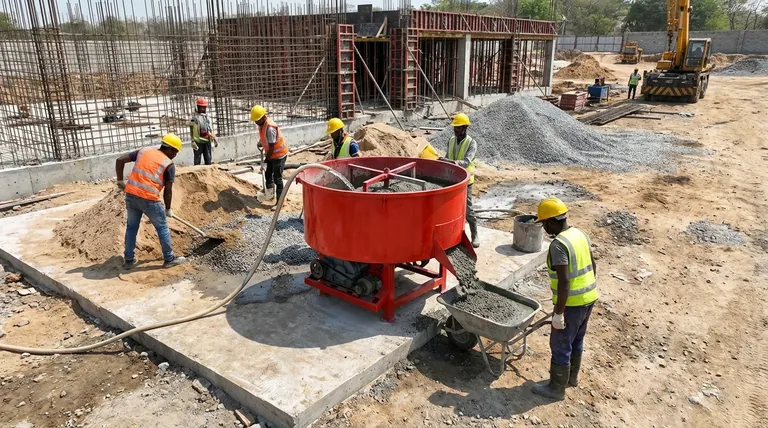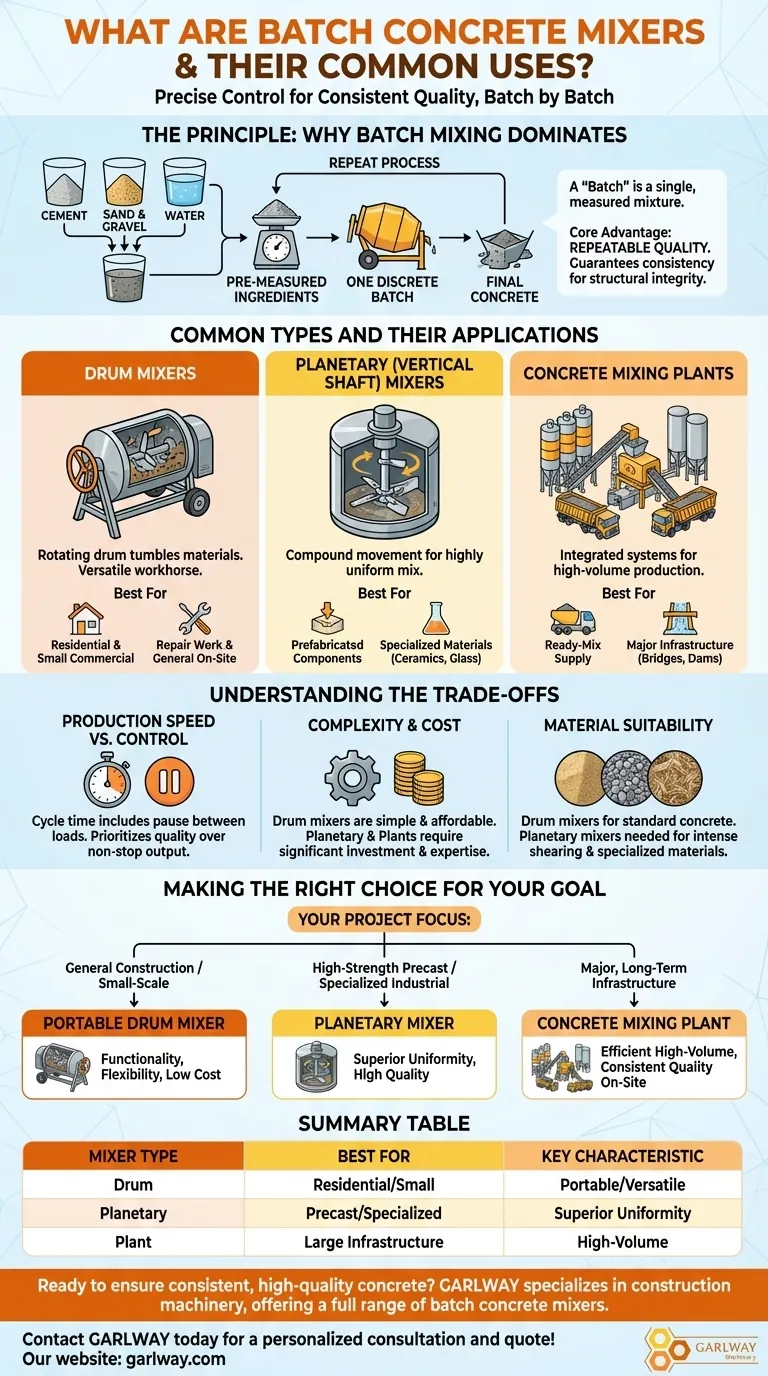In essence, a batch concrete mixer is the most common type of mixer used to produce concrete in specific, controlled quantities. Unlike a continuous process, it mixes one discrete "batch" at a time, allowing for precise control over the proportions of cement, sand, gravel, and water, ensuring consistency and quality for each load.
The core value of batch mixing is control. By producing concrete in distinct, measured amounts, these mixers provide the consistency required for everything from a small residential foundation to massive civil engineering projects.

The Principle: Why Batch Mixing Dominates
What Defines a "Batch"?
A batch is a single, complete mixture created from a pre-measured set of ingredients. Once that batch is mixed and discharged, the process starts again with a new set of materials.
The Core Advantage: Repeatable Quality
This method guarantees that every single batch has the same recipe. This level of quality control is critical for ensuring the structural integrity and performance of the final concrete structure.
Common Types and Their Applications
Different projects demand different scales and mixing actions. Batch mixers are designed to meet these varied needs.
Drum Mixers
This is the most recognizable type, featuring a rotating drum to tumble and mix the materials. They are the versatile workhorses for a wide range of tasks.
Drum mixers are ideal for residential and small-to-medium commercial buildings, repair work, and general on-site mixing where portability and simplicity are key.
Planetary (Vertical Shaft) Mixers
These advanced mixers use a more complex action where mixing blades rotate while also revolving around the central axis of the mixer. This compound movement creates a highly uniform and homogenous mix.
They are essential for applications requiring superior quality, such as producing prefabricated concrete components, concrete bridge frames, and mixing specialized materials like ceramics, glass, or refractories.
Concrete Mixing Plants
These are not single machines but large, integrated systems designed for high-volume batch production. They are commonly used for ready-mix concrete supply and major construction sites.
Their deployment is reserved for large-scale projects like bridges, dams, power plants, and airports where there is a massive and sustained demand for high-quality concrete.
Understanding the Trade-offs
While batch mixers are the industry standard, the choice of a specific type involves clear trade-offs.
Production Speed vs. Control
The primary trade-off is cycle time. Because each batch is a discrete process, there is a pause between loads. This is a deliberate choice that prioritizes quality control over the non-stop output of a continuous mixer.
Complexity and Cost
A small, portable drum mixer is a relatively simple and affordable piece of equipment. In contrast, a planetary mixer or a full mixing plant is a significant capital investment that requires specialized operation and maintenance.
Material Suitability
While standard drum mixers are versatile enough for concrete, sand, and gravel, they may not provide the intense shearing action needed for high-performance or specialized materials. This is where planetary mixers become a necessity.
Making the Right Choice for Your Goal
Matching the equipment to the project's scale and quality requirements is crucial for success.
- If your primary focus is general construction or small-scale work: A portable drum mixer provides the necessary functionality with maximum flexibility and minimal cost.
- If your primary focus is manufacturing high-strength precast components or specialized industrial materials: A planetary mixer is the only way to guarantee the required mixing uniformity and quality.
- If your primary focus is a major, long-term infrastructure project: A dedicated concrete mixing plant is the most efficient solution for producing large volumes of consistent, high-quality concrete on-site.
Ultimately, choosing the right batch mixer is about aligning the machine's capabilities with the specific demands of your project.
Summary Table:
| Mixer Type | Best For | Key Characteristic |
|---|---|---|
| Drum Mixer | Residential & small commercial projects | Portable, versatile, cost-effective |
| Planetary Mixer | Precast components & specialized materials | Superior mixing uniformity, high quality |
| Mixing Plant | Large infrastructure projects (dams, bridges) | High-volume, on-site batch production |
Ready to ensure consistent, high-quality concrete for your project?
GARLWAY specializes in construction machinery, offering a full range of batch concrete mixers—from portable drum mixers to advanced planetary mixers and batching plants—for construction companies and contractors globally. Our experts can help you select the perfect equipment to match your project's scale and quality demands, ensuring efficiency and structural integrity.
Contact GARLWAY today for a personalized consultation and quote!
Visual Guide

Related Products
- Commercial Construction Mixer Machine for Soil Cement Mixing Concrete
- Auto Concrete Cement Mixer Machine New
- JDC350 Small Cement Concrete Mortar Mixer
- HZS90 Large Multiquip Concrete Mixers for Construction
- Construction Products Concrete Plant Machine Mixing Concrete Mixer
People Also Ask
- How does a continuous mixer operate differently from batch mixers? Optimize Your Concrete Production Scale
- What are the features and applications of twin-shaft mixers? Maximize Your Concrete Production Speed & Quality
- How does a 55-gallon drum roller operate? A Guide to Safe, Sealed Mixing
- How is the water supply determined for a concrete mixer? Master Precise Mixing for Superior Concrete
- How are industrial mixers used in the pulp and paper industry? Ensure Consistent, High-Quality Pulp
- What cost benefits do self-loading mixer trucks provide? Slash Labor, Waste & Transport Costs
- What is the advantage of the 270-degree rotation of the mixing tank? Unlock Superior Job Site Efficiency
- How does a concrete mixer contribute to environmental sustainability? Reduce Waste & Emissions with On-Site Mixing



















